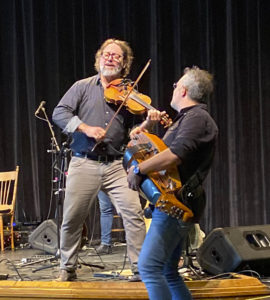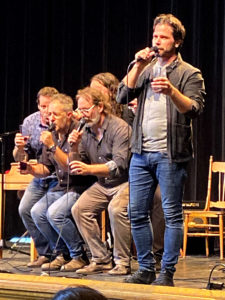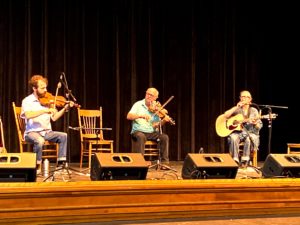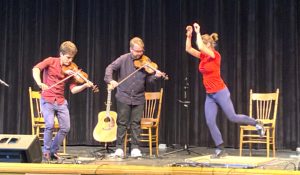The traditional music of Quebec has its roots in the songs and dances that early French settlers brought from Brittany, so it shares a Celtic connection with traditional Irish and Scots music. Meanwhile, in the centuries since those, the music of Quebec, the Maritimes, and New England have all influenced each other, producing what one artist I heard yesterday call a “mishmash.”
Since 1992 the annual New World Festival has been showcasing traditional Celtic-based music and dance in Randolph, Vermont. This year’s festival, on September 4, marked the its thirtieth anniversary, and beloved performers young and old returned for the gala celebration, in and around Chandler Center for the Arts. Superb lifelong fiddlers and guitarists hailing from Quebec, the Maritimes, and New England regaled the delighted festival-goers with jigs and reels, ballads and step classics.
Even in a sizable concert hall like the Chandler, the music somehow retains the domestic ambience that marked its origins In their respective parts of the New World, early French, Irish, and Scots settlers would gather around a neighbor’s woodstove, while musicians in the corner played instrumental dance tunes, in spontaneous, intimate jam sessions, accompanying themselves with seated clogging or podorythmie, while friends step-danced across the floor.
The kitchen party lives on today in homes around Quebec and the Maritimes, but over the last century the music moved far beyond household entertainment, absorbing new influences and becoming a component of the international entertainment business. Still, their repertory remains based on traditional songs. The finest Quebec performers balance the spontaneity and intimacy of the kitchen party with new cosmopolitan influences on the global stage.
The Quebec band Le Vent du Nord strikes this balance with consummate skill. Since they came together in 2002, they have featured not only traditional repertoire but tunes they compose themselves. And to the fiddles and guitars, they add the hurdy-gurdy (vielle à roue), played by Nicolas Boulerice, which complements the traditional instrumentation well, as does the accordion played by Réjean Brunet.
As these five men seized the stage the Chandler, they proclaimed their desire “to share our passion for the traditional music of Quebec,” Then launched into a high-energy performance, and the audience was all in. Celebrating their own 20th anniversary this year, the band members took time out to describe months of their life on the road, traveling together in cramped quarters, eating too much bad food, and bickering. “We have French blood, so we know what is arguing for nothing,” quipped Boulerice. “We know you don’t have to have a position to argue!”
They performed “The Blood of our Trees,” about maple syrup, a tribute to the iconic product common to both sides of the border. And the name “Americans,” Olivier Demers pointed out, “does include those of us north of the border.” Also noting the importance of First Nations to the survival and flourishing of Quebec culture, Demers remarked that today we can all be called “Amériquois,” and launched into a song of that name, with the refrain: “Amériquois gens du voyage, / Québékana en métissage / De nos amours, de nos courages, / marquer nos chants du paysage.”
The audience’s insistent foot-stomping shook the floor of the Chandler, so much I wondered if it could hold. Robert Resnik, host of All the Traditions on Vermont Pubic, remarked that Le Vent du Nord is “one of my favorite bands in the whole wide world,” and I am in no position to argue!
Other notable Quebec-based acts I saw were the Tuning Stile, a duo who’ve performed since 2008. Joanne Garton (fiddle) and Aaron Marcus (piano) interwove melodies and harmonies, using their feet for percussion, they took turns step-dancing to each other’s riffs.
Zigue is a family act—Claude Méthé (fiddle, vocals), and Dana Whittle (guitar, vocals)—performing since 1992. Now joined by their son Aimé Méthé (fiddle), they recreate their own versions of traditional songs, especially songs about love and jealousy, interspersed with the affectionate byplay.
Next Alexis Chartrand (fiddle) and Nicolas Babineau (guitar) dazzled us with their playing. “I like to strip away the words” and embellishments of a traditional melody, Chartrand explained. “What’s left is the straightforward tune”–and his joy is to rework it, slowing and speeding the rhythm, raising and lowering the dynamics. He and Nicolas were joined by Mélissandre Tremblay-Bourassa, a dancer who stepped, hopped, twisted, and turned, all the while using her shoes as percussion, tapping with the heels, softly sanding with the soles, bumping with the toes.
The joy continued long after I had, reluctantly, to leave to catch the Amtrak train back to Burlington. I missed many fine performances. If you haven’t yet attended the New World festival, try to make it next Labor Day weekend. In these stressful times, we can all use a little Quebec kitchen party.
–Janet Biehl
Photos by Janet Biehl. The AFLCR has no affiliation with the New World Festival.




